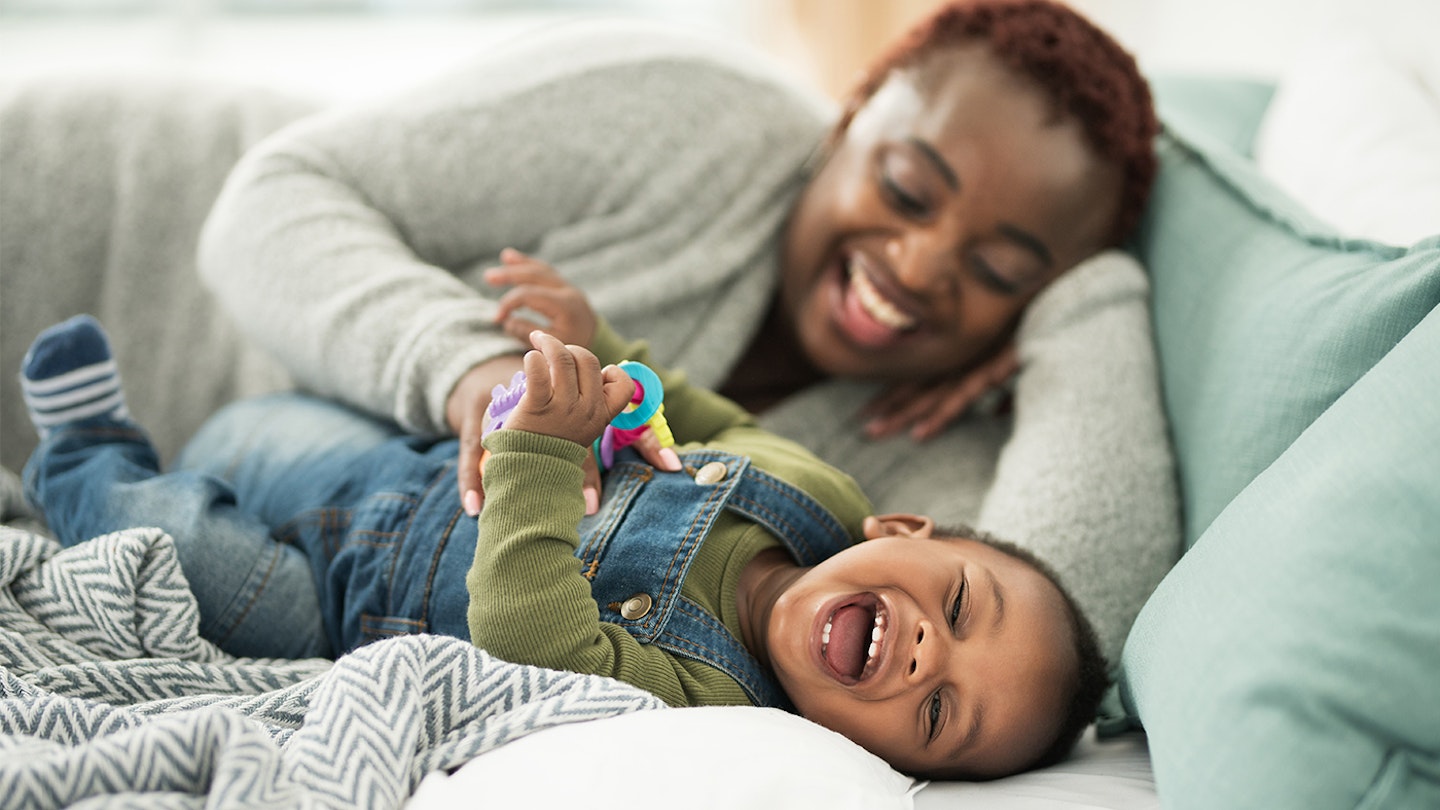'When do babies laugh?' is a question every new parent wonders. It’s one of those milestones we all eagerly await - how long until we hear the joyful sound of our little one’s first giggle? Once that magical moment arrives, you’ll eagerly await more of those precious baby milestones. But when can you expect it, and how can you encourage it?
When do babies laugh?
"The first time your baby laughs is – on average – around three months old to four months old," says Developmental psychologist Dr Caspar Addyman, director of the Goldsmiths InfantLab and author of The Laughing Baby. "But researchers have found that babies start smiling in the womb. You might even hear your baby doing their first laugh when they're just a few weeks old. This will be a very small, breathy noise because the muscles in their rib cage aren’t yet strong enough for a full-on chortle – but you’ll still know that they're finding something funny."
Why do babies laugh?
Every baby is different, and how much each baby laughs varies from infant to infant – but you might find that your baby seems to snigger at some very surprising things. It might be the sight of their toes wiggling. It might be the unexpectedly comical sight of Daddy without his glasses on or the amazing sound of a spoon thumping on their tray. And it will almost certainly be a beam of delight at the joy of seeing you.
"Babies will laugh with delight at the sight of Mum – the most important person in their world," says Caspar. "And they often grin when they clock something about how the world works. The important thing to remember is that when your baby laughs, they're sharing a moment of triumph or joy with you. They want you to enjoy the experience, too!"
We’re not the only species who can share a joke. Apes do it. Rats do it! Lots of animals seem to have a sense of fun. And giggles and smiles are deep-rooted in human evolution, too. When a behaviour is this ancient and this widespread, it suggests it plays a very important function... "Researchers think that laughing is a key way of helping humans to bond," says Caspar. "That’s important to all of us, but it’s vital for babies who rely on their caregivers for everything. They have to bond!" And a shared chuckle is a fail-safe way to do that.
"Laughing connects us," says Caspar. "It’s a pre-verbal way of communicating. It releases endorphins – the brain chemicals associated with reward and pleasure – and it signals that we trust the people around us." When we laugh, we’re using our lungs. So, when we’re giggling, we don’t have the spare energy to do anything else (like fight or run away). Why’s that important? Because it means we can only truly laugh when we feel safe and relaxed. If someone is laughing with you, they feel safe with you. When your baby laughs, they're happy and comfortable.
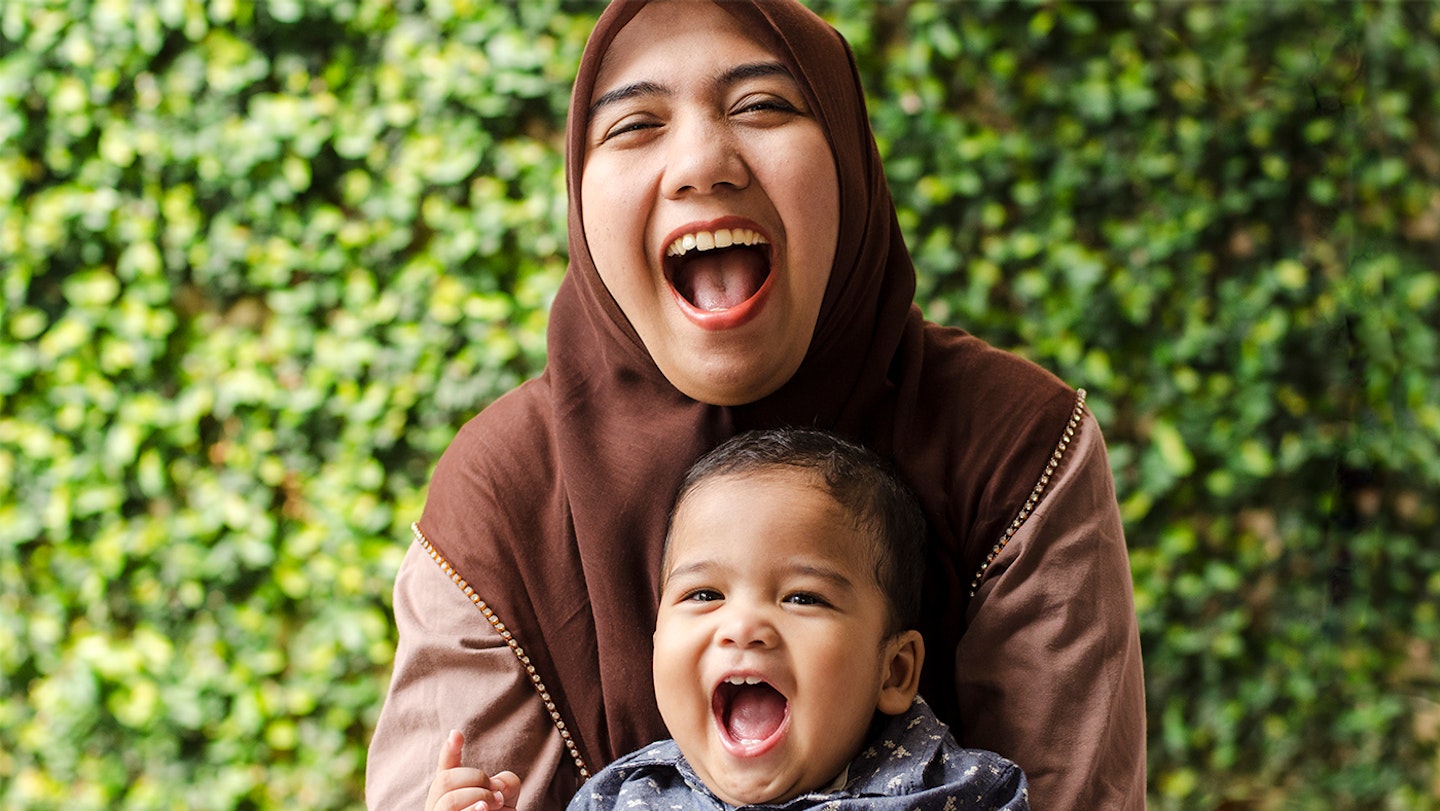
How to respond to your baby's laughter
"Pay attention!" says Caspar. ‘When babies cry, we look to see what the problem is so that we can try to fix it. When your baby laughs, look to see what’s caused the happiness because they want you to share it.’
But – disclaimer: It may be that the activity that’s bringing your baby joy is throwing their carefully made lunch onto the floor or scribbling on the wall with crayons. If you pay attention to these behaviours, you will encourage them. So, you may not want to pay careful attention to every moment of joy. "But when you do share (appropriate!) moments of laughter with your baby and pay attention to their happiness, you enhance that happiness," says Caspar. "You encourage them to invest more time in this activity that brings them joy."
How to encourage your baby's laughter
So, the trick is to find the things that make you both happy and to make the absolute most of them. Ready? Here are eight simple ways to get a smile...
One to three months
• Play Peek-a-Boo: This classic game is a surefire way to get your baby’s first smiles.
Babies enjoy seeing you appear and disappear in their limited vision, bringing them simple joy from your attention.
Between birth and the age of two-and-a-half to three, a sure-fire way to get a big baby grin is to play a spot of peek-a-boo. The game grows with your little one as they begin to gain more understanding, but it can be enjoyed by both of you from birth.
Then, when your baby’s eight or nine months old, they will have developed object permanence. In other words, they know that you exist, even if you’re not right there in front of them. "By this stage, the delight in peek-a-boo seems to come from the fact that, when you hide behind your hands, your baby knows you’re there – and when you re-appear, you’re confirming their prediction and showing them that their expectations were right," says Caspar. "They're happy because they understand!"
The game reaches another level around your baby’s first birthday. "At around 12 months, babies start to notice that they can make you laugh," says Caspar. "This ushers in a whole new variety of fun. From now on, your baby will love doing things that make you smile and laugh in response. So, they'll laugh at peek-a-boo for the sheer pleasure of seeing and hearing your reaction."
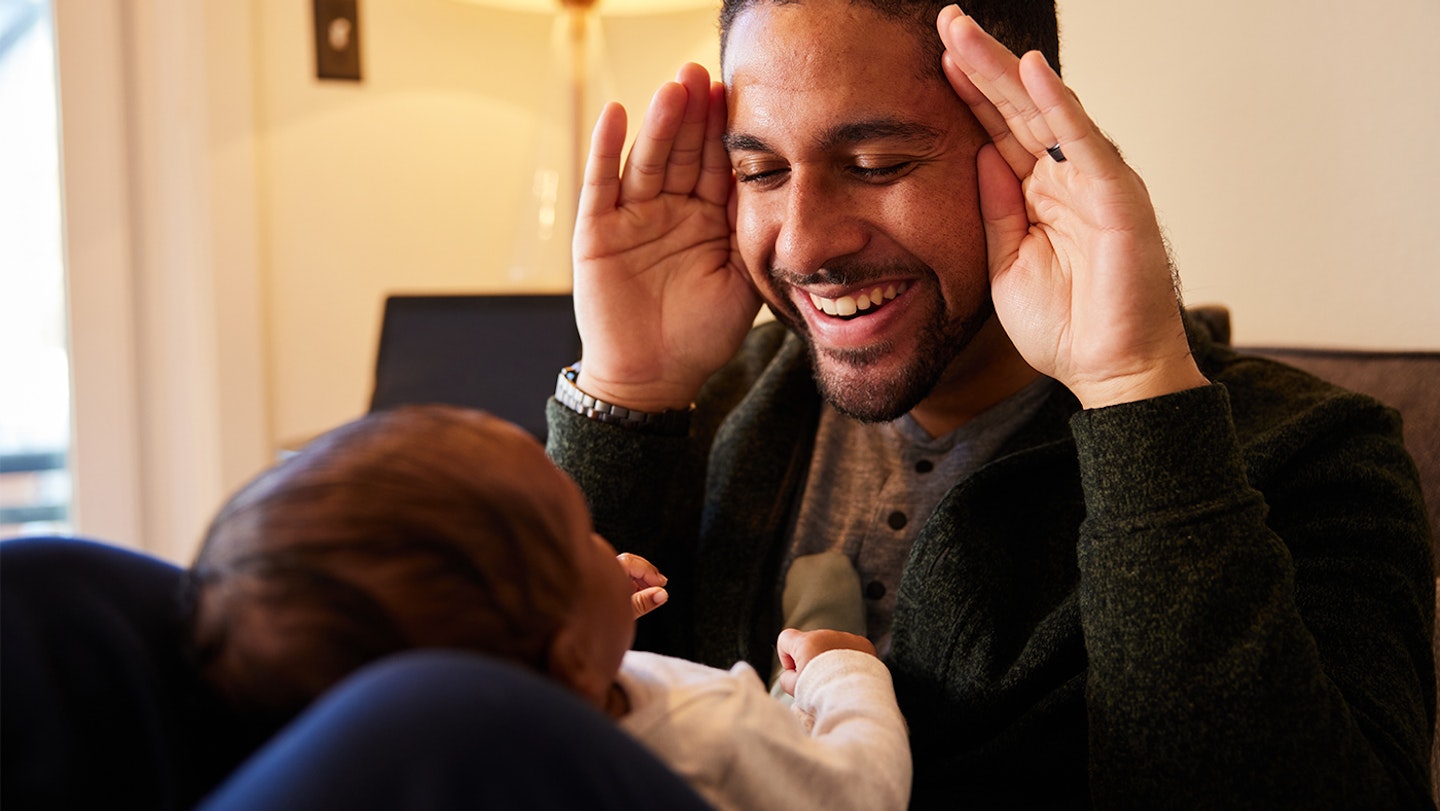
Four to six months
• Try some tickles: Babies respond to gentle tickling with giggles.
• Give them a massage: Baby massage promotes relaxation and connection.
• Blow some raspberries: Babies love the sound and sensation of raspberries on their skin.
Touch stimulates the brain and creates a contrast between alertness and safety, which causes laughter. As babies grow, they'll giggle at the mere suggestion of a tickle.
There’s something almost magical about physical touch. It doesn’t always provoke all-out laughter, but it produces smiles, relaxation, and soporific happiness in many babies.
"There are lots of reasons for that," says Caspar. "Humans have receptor cells in their skin that respond to stroking, lowering stress levels and boosting our immune systems." Massage is a way of gently caressing your baby, and – done well – it’s a very responsive form of interaction. You’re paying attention to what your baby likes, and they're communicating with you.
"Plus, as with raspberries (see below), being massaged helps your baby to become more aware of their body," says Caspar. "That awareness helps them to feel secure in the world.
Five months to six months
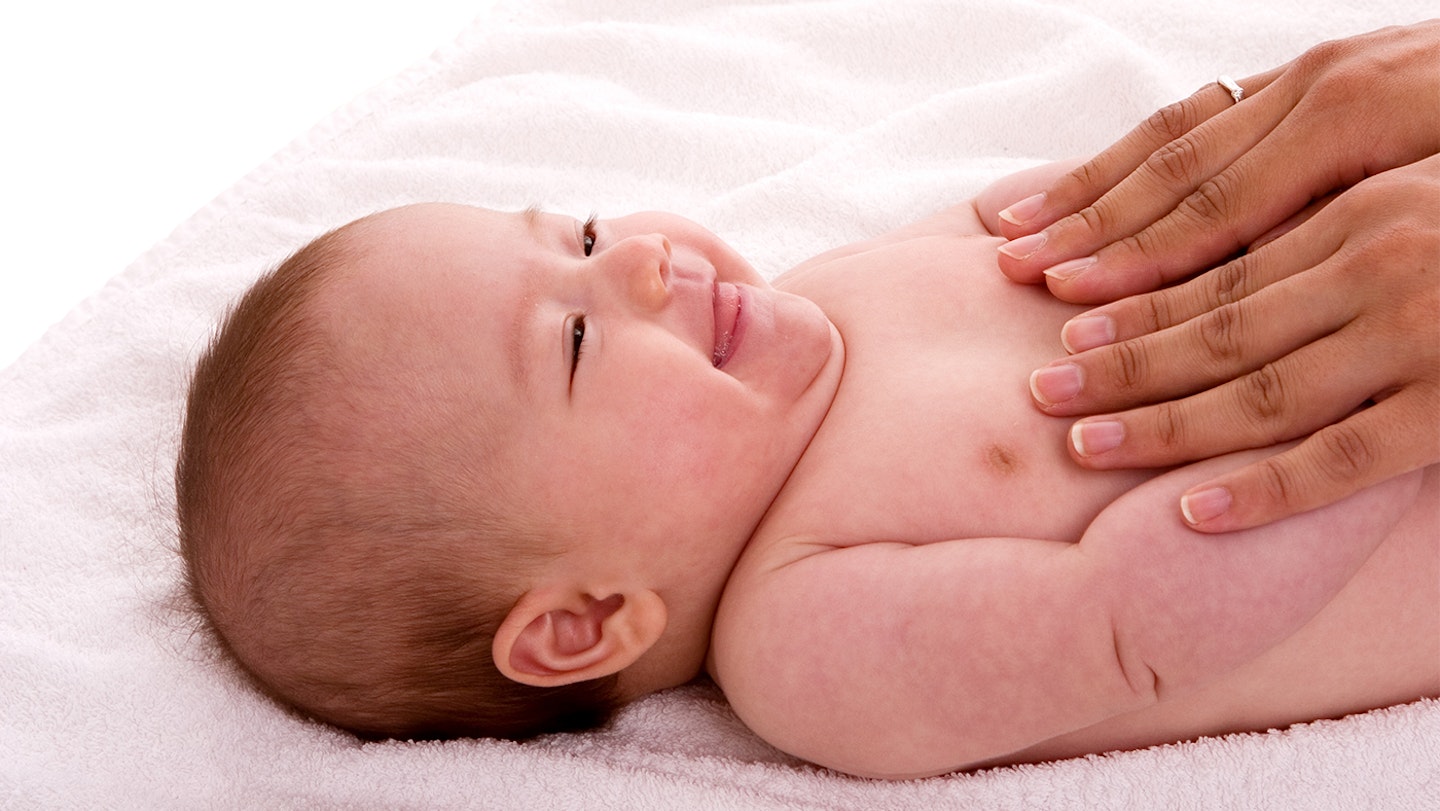
•Bash some blocks: At this age, babies begin manipulating objects.
Let your baby explore with blocks—building, knocking over, and giggling at their creations or tumbles. The joy comes from their new skills.
At around four to five months old, babies have gained the muscle strength, coordination and motor skills they need to be able to manipulate objects. From this age on, you can get a baby belly laugh by letting them hold, build, throw and bash toy blocks. But why is this so satisfying?
"Babies get a big kick from exploring the world," says Caspar. "All humans are happy when they enter the ‘flow state’ – the state of being in which we’re absorbed in what we’re doing, and we’re happily practising and refining our skills. Blocks are a wonderfully simple way of learning to move and manipulate other objects. So, when your baby side-swipes their tower of blocks and giggles as they tumble to the floor, the joy comes from the fact that they did that. Result!"
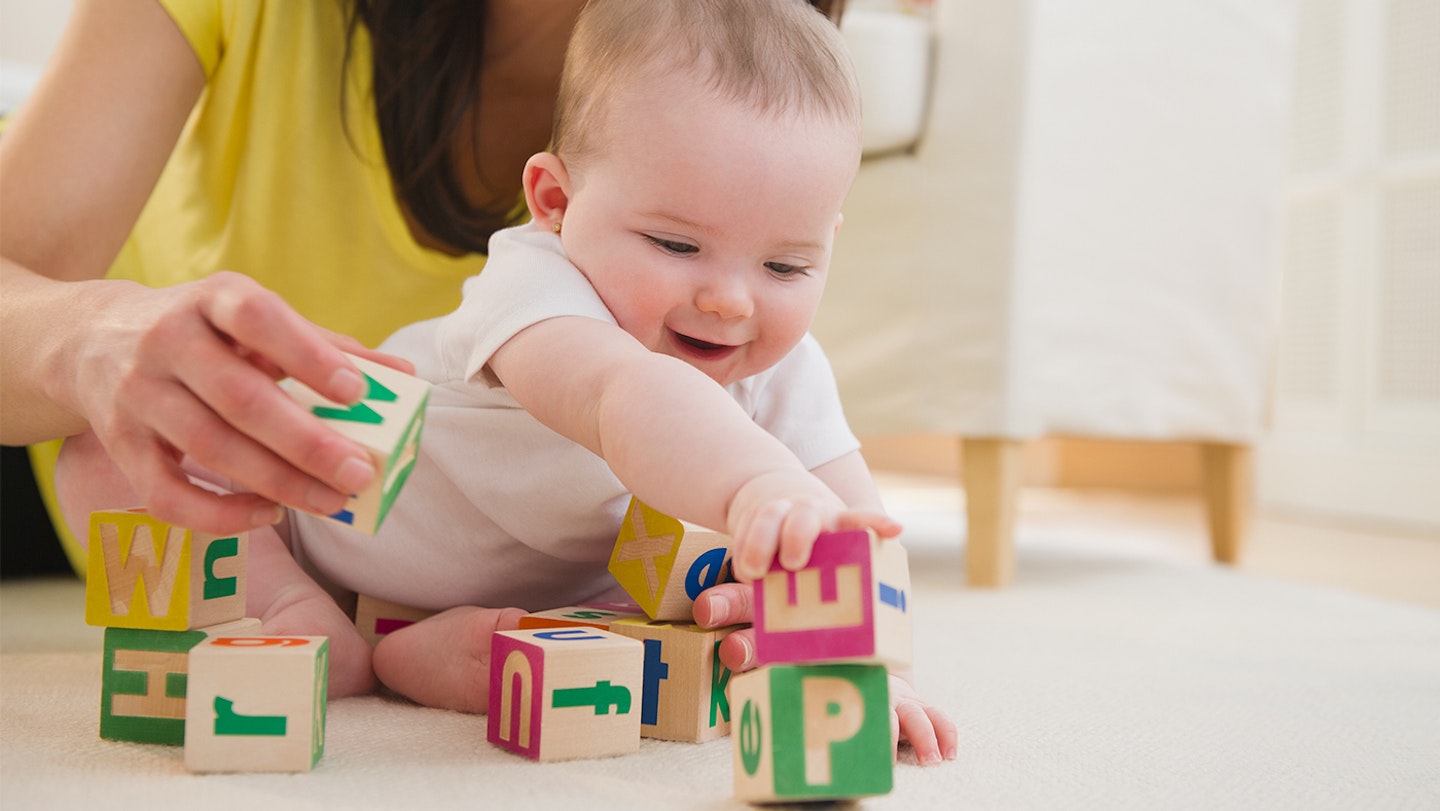
Six months to eight months
• Take flight!: Baby's head and neck control allows for flying games.
Hold your baby around your chest and lift them in the air—babies love the sensation of movement, which triggers giggles.
You sit on the floor facing your baby, hold them firmly around the chest, and say, ‘One, two, three... whee!’ On the whee, you roll backwards, so that you’re lying on the floor and they are ‘flying’ above you.
"This provokes laughter because you’re playing a game together and because babies love those sensations of being moved," says Caspar.
As babies get older, they love the experience of moving in new ways: playing the flying game, swooshing in a baby swing, and, later on, sliding down a slide.
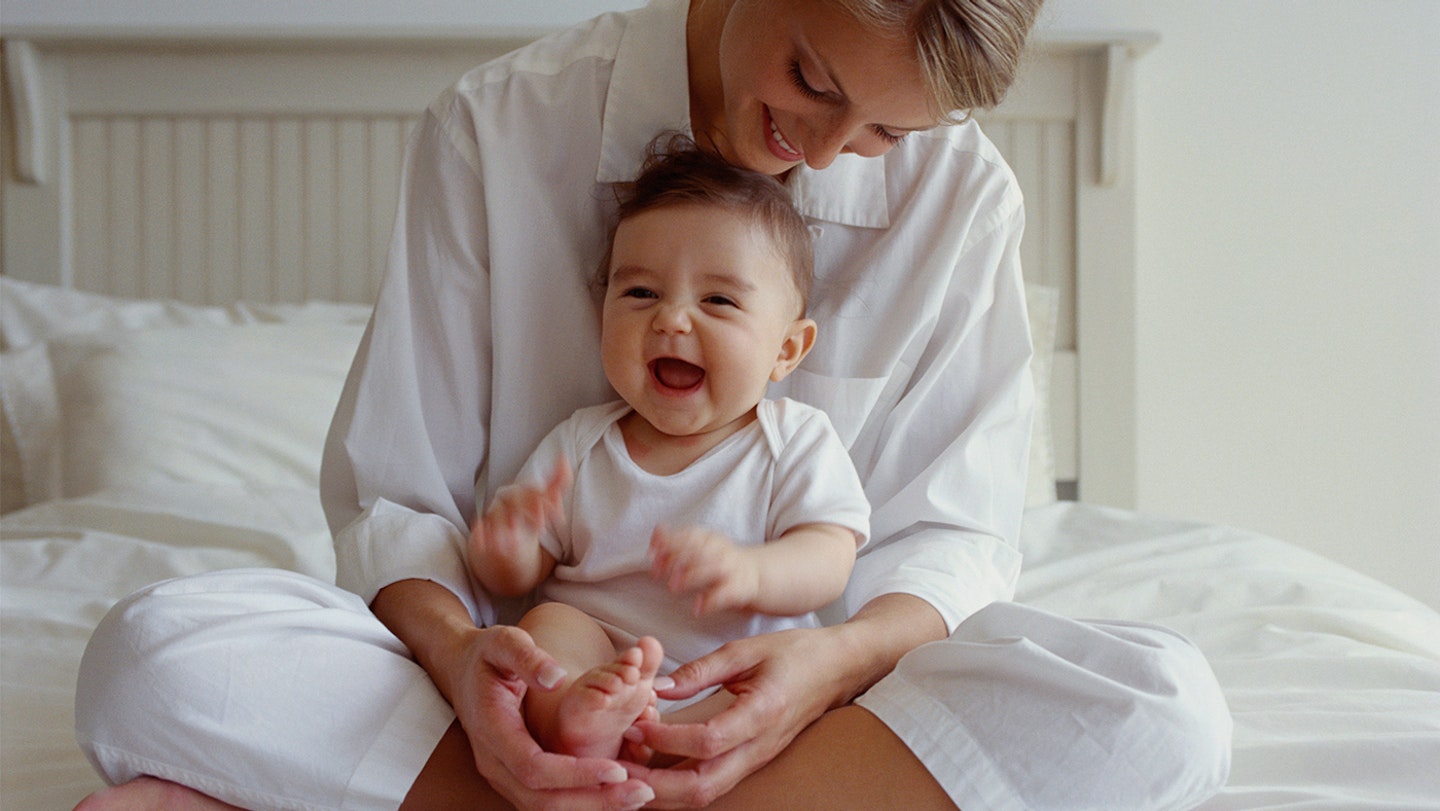
Nine months to 17 months
• Make a nappy hat: Babies at this age love unexpected, silly activities.
Little ones enjoy the surprise and playfulness of things like socks on their hands or nappies on their heads. Mixing routines and engaging in silly games is fun.
Somewhere between the ages of nine and 15 months, your baby gets sussed about what this life is all about. They know how your day works. They understand what to expect. They get the routine. "Which is why they understand when you do something silly and unexpected that’s out of routine," says Caspar. "We’re talking socks on hands, (clean) nappies on the head, buckling their toy into the pram and putting them in the toy basket. They're alert to the fact that you’re deliberately mixing things up to play a game with them – and they love it!"
18 months and up
• Engage in role-play: As toddlers start imaginative play, the fun intensifies.
Playing pretend games, such as being a parent or making decisions, gives toddlers a sense of control and sparks their creativity, making them laugh in the process.
When your youngster starts to role-play and engage in imaginative play, they do all sorts of things that help make themselves happy. They're demonstrating their understanding of the world. They're building their skills and making decisions. And when you get involved and play with them, the fun intensifies.
"You’re giving them your attention, which is peak pleasure for youngsters," says Caspar. "And in lots of these make-believe games, you’re allowing the roles to be reversed and giving them a bit of power. They're playing mum and putting you to bed. They're going to the shops and deciding what food to buy. They're giving you a treat of some cake and a cup of tea. Never underestimate how much your youngster will love to play in this way with you. If you fully enter the game and pay your part, you’ll both smile."
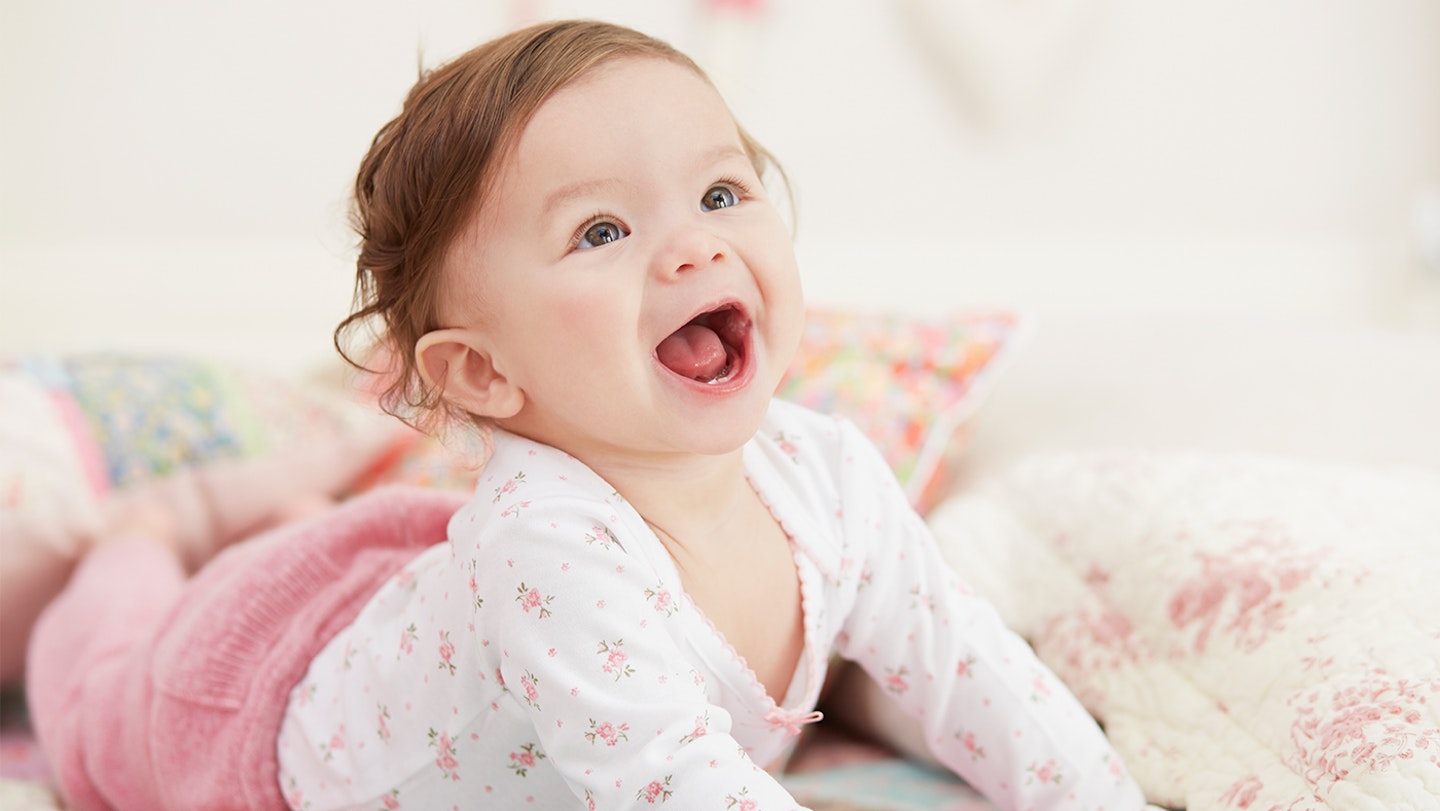
Why would a baby not laugh?
If you find at times that your little one isn't reacting to things that usually make them laugh or even just don't do it very often, don't fret. As with all milestones, babies develop at their own rate, and they may just need a little more time. Or it might simply be part of their little personality; just like certain adults can be quieter, more sensitive, and shy, so can babies.
If your baby shows no signs of laughing towards the end of seven months, chat with your health visitor about your concerns.
Katie Masters has been a journalist for 14 years, starting out as a writer for Take A Break magazine and working as staff on Bliss, New Woman, Grazia and Sugar. Since going freelance, she has worked for many titles, both newspapers and magazines.
Meet the expert:
Caspar Addyman is a developmental psychologist specializing in infant learning. He conducts studies with babies and develops computational models of behaviour. His research spans early concept learning, language development, time perception, and infant sleep. Caspar focuses on how positive emotions benefit babies and engage caregivers, with recent work exploring the science of baby laughter and using machine learning to assess mother-infant interactions in low-resource settings. He is also an advocate for open science and has a strong track record in commercial collaborations and sharing software.
